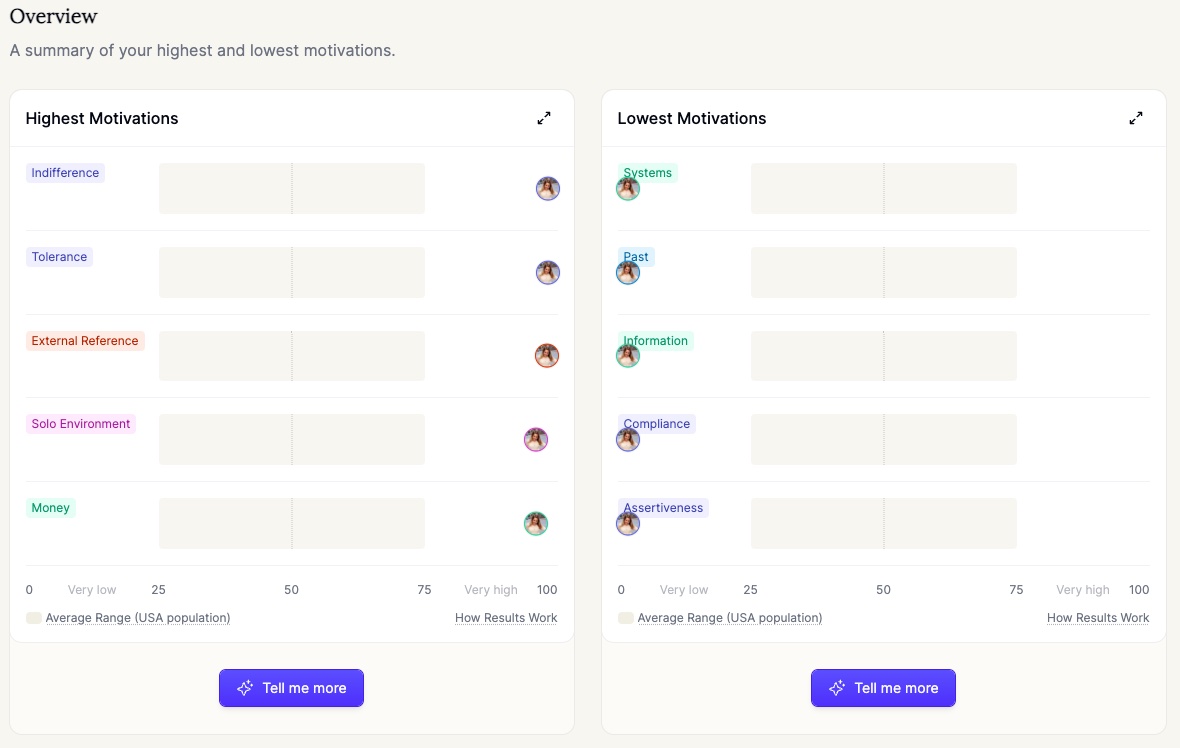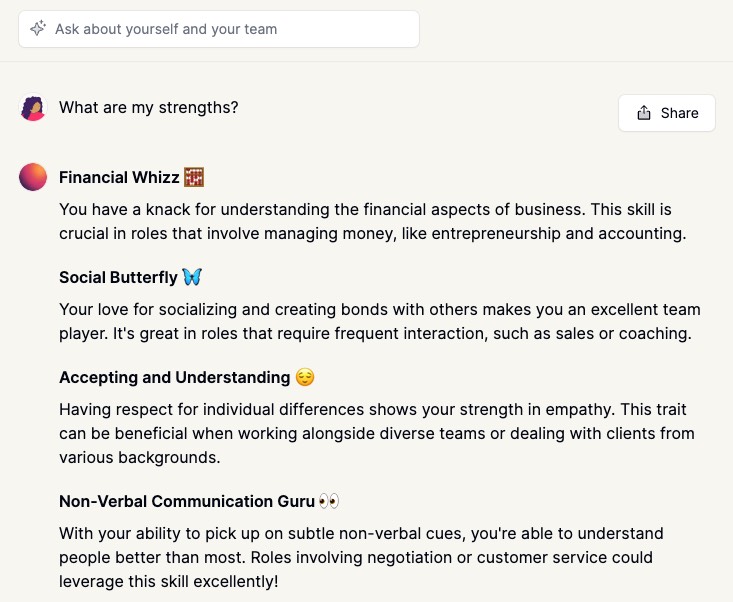How to identify employee areas of improvement at work
As a leader, identifying areas where your team can grow is crucial for their success. Learn how to spot development opportunities and create supportive action plans that transform potential into lasting professional growth.
- Author
Aleney de Winter

What are areas for improvement?
“The shift to lifelong learning is absolutely essential. As the pace of technological change quickens, we need to be sure that employees are keeping up with the right skills to thrive."
- Zvika Krieger
Growing at work isn't just about yearly performance reviews anymore – it's about staying ready for what's next in your team's career. Areas for improvement are specific skills or behaviors you can strengthen so your team becomes more effective in their role.
Think of them as personal growth roadmaps. They help your team set clear goals for development. But here's the key: they work best when you make them specific and actionable.
For example, instead of saying, "I need to work on communication," try, "I want to feel more confident leading team presentations." This shift makes goals real and achievable.
Here's a great example from Max Shak, Founder of nerDigital:
One of his team members, John, turned a common challenge into a success story. During a promotion interview, instead of just listing weaknesses, John shared how he'd tackled his fear of public speaking. He joined Toastmasters and took speaking courses. This showed more than just improvement – it showed initiative and commitment to growth.
The best part? John didn't just get the promotion – he created a clear path to get there. His story shows how being specific about improvement areas and taking action can transform your team's careers.
Ready to identify your team's areas for improvement? Let's look at some key areas where you might want to focus...
Common areas of improvement for employees
Continuous improvement is not about the things you do well—that’s work. Continuous improvement is about removing the things that get in the way of your work. The headaches, the things that slow you down—that’s what continuous improvement is all about.
- Bruce Hamilton
Growing at work isn't just about doing more – it's about working smarter and removing obstacles that hold your team back. When you focus on improvement, you not only enhance your team's capabilities but also develop growth-minded team members.
Let's break down the key areas where most professionals can make meaningful progress:
Core professional skills:
- Managing time and priorities effectively
- Organizing work for maximum impact
- Communicating clearly and confidently
- Thinking strategically about challenges
- Leading projects and initiatives
People and emotional skills:
- Building stronger workplace relationships
- Handling difficult conversations with grace
- Listening actively and understanding deeply
- Staying resilient when facing setbacks
- Working well with different personalities
Research in the Journal of Occupational and Organizational Psychology reveals something interesting about personal growth at work: focusing on strengths can boost your team's confidence and drive to grow. The study found that when employees better understand and use their strengths, they're more likely to take charge of their own development – especially those who might not feel super confident about their abilities.
This suggests an important shift in how we think about improvement at work. Instead of just focusing on fixing weaknesses (which we prefer to call blind spots), start by recognizing and building on what your team is already good at. This positive approach can help your team feel more capable and motivated to grow in all areas of their work.
Ready to explore these areas and find the ones that will make the biggest difference for your team?
📖 Read: 20 Areas of improvement examples for today's AI workplace to start working on today. 🎯
Identifying your team's areas of improvement
Self-reflection is a humbling process. Finding out why you think, say, and do certain things is essential—then better yourself.
- Sonya Teclai
The most successful professionals don't just work hard – they take time to understand themselves better. This means looking honestly at strengths and the areas where your team could grow.
But here's the thing: real growth starts with asking your team the right questions, like:
- What energizes them at work?
- Which tasks do they tend to avoid or find challenging?
- Where do they want their career to go in the next few years?
- What skills would help them get there?
This isn't about creating a list of flaws or ticking boxes in a review form. It's about your team understanding themselves better to make meaningful progress in their career. Think of it as creating a personal growth map – unique to their goals and aspirations.
📊 Innovative tools can help guide your team's journey. For instance, our XFactor success models help you understand your team's unique strengths and the areas where you might want to focus your development efforts. Invite your team to answer questions on what motivates them to receive instant insights.
Want to turn these insights into action? Our AI coach Marlee can help:
- Create a personalized online coaching development plan
- Navigate workplace challenges
- Build stronger professional relationships
- Develop specific skills you want to improve
Ready to discover your team's growth opportunities and create a clear path forward? Let's start with understanding where they are today so we can help you get them where you want to go.

A Marlee "My Results" board showing the highest and lowest motivators
Have a specific challenge you want to tackle? Chat with Marlee about what's on your mind - whether it's personal growth areas or tricky team dynamics. You'll get practical steps you can take right away to improve your team's skills to work better with others.

Ask Marlee, our AI coach, "What are my (or my team's) strengths?"
While Marlee offers invaluable insights, remember that growth comes from multiple sources. Here are simple ways for your team to gather insights about their development:
- Ask key stakeholders for specific examples during performance reviews
- Get honest feedback from colleagues and mentors
- Notice patterns in their work - what comes easily and what consistently challenges them
- Make time to reflect on their progress regularly
- Connect with people outside your team to gain fresh perspectives
The best insights often come from combining AI coaching with real-world feedback and self-reflection. This gives you a complete picture of where they can grow.
How to implement self-improvement strategies
The greater danger for most of us lies not in setting our aim too high and falling short, but in setting our aim too low and achieving our mark. – Michelangelo
Turning growth goals into reality starts with a clear plan. Here's how to make meaningful progress:
Set goals that work:
- Make goals SMART (Specific, Measurable, Achievable, Relevant, Time-bound)
- Break big goals into smaller steps your team members can achieve
- Align their growth with your team's goals
- Focus on what will make the biggest impact first
Keep momentum going:
- Get regular feedback from trusted colleagues
- Learn from setbacks without dwelling on them
- Invest in training that matters for their role
- Find them a mentor or coach
Navigate the challenges:
“Sometimes, if something doesn't go well, I dwell on it too long, and this slows me down. I now learn from what went wrong, let it go quickly, and move on, and I'm much more productive”
- Barry Drexler, CEO of Expert Interview Coaching
- Many people face self-doubt (imposter syndrome) which can be paralyzing
- Turn failures into learning opportunities
- Celebrate small wins along the way
- Reassure your team to get comfortable being uncomfortable – that's where growth happens
Track their progress:
- Set clear milestones to measure their growth
- Check in regularly on their goals
- Adjust your approach based on what's working
- Keep learning as your industry evolves
Growth at work isn't just about ticking boxes or hitting targets – it's about ensuring your team is becoming better at what they do, one step at a time. Whether you're aiming for them to improve specific skills, take on new challenges, or advance their career, remember that meaningful change happens through consistent small actions. Start with one area you want them to improve, make a clear plan, and take that first step. Your team will thank you for starting today.
🎯 Start for free with Marlee today
Frequently asked questions
What are some unconventional ways to identify areas of improvement in the workplace?
Beyond traditional methods like self-assessment tools and feedback, consider seeking insights from interdisciplinary fields.
Engage in hobbies outside of work. Or, take part in volunteer activities to gain new perspectives on your strengths and weaknesses.
What role do mindfulness and self-awareness play in identifying areas for improvement?
Mindfulness practices, such as meditation or journaling, can enhance creative thinking and self-awareness. This helps you identify patterns of behavior or thoughts that may be hindering progress.
How can individuals incorporate feedback from failure into their self-improvement strategies?
Failure is a natural part of the learning process. It provides ample opportunities for personal and professional growth.
Instead of viewing failure as a setback, use it as an opportunity to reflect, learn, and develop innovative solutions for improvement.
You will cultivate resilience and adaptability by embracing failure as a stepping stone to success.
How can Marlee help individuals identify their areas for improvement?
Marlee provides insights into an individual's work traits for success. By answering questions on what motivates you and analyzing the results, you can pinpoint strengths, identify potential blind spots hindering progress, and make development plans.
What role does AI coaching play in self-improvement strategies?
AI coaching provides personalized insights and recommendations based on motivational results. It helps individuals understand their areas for improvement.
It also offers actionable growth strategies and tips for employees and leaders through short online coaching sessions.


